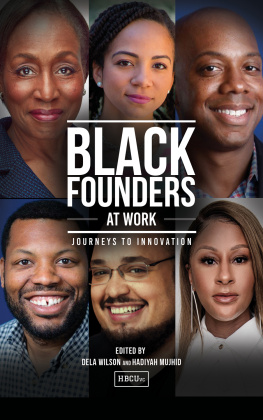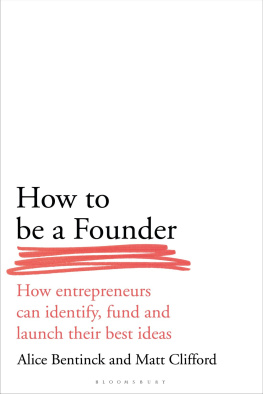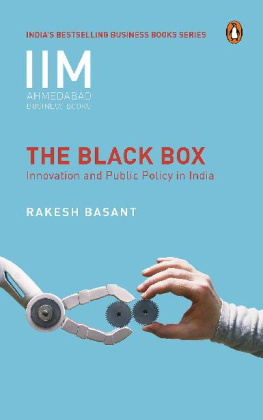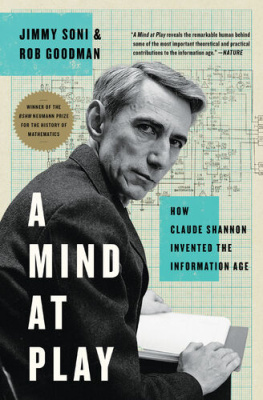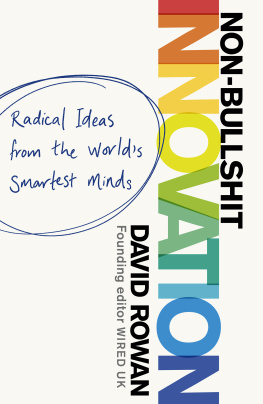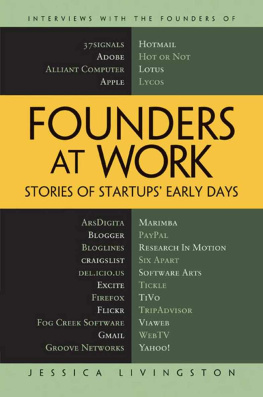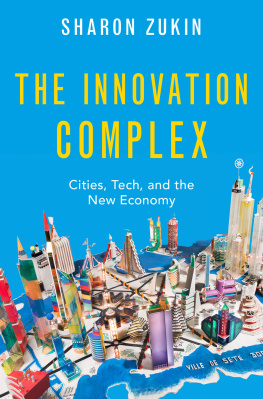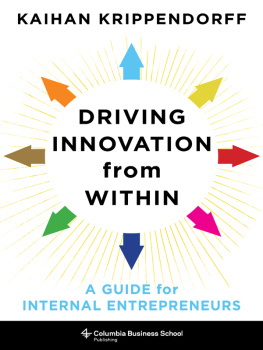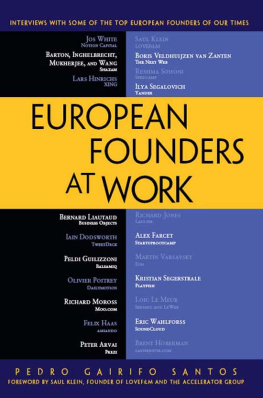
HBCUvc
Black Founders at Work: Journeys to Innovation
2021 by HBCUvc (fiscally sponsored project of Social Good Fund EIN: 46-1323531)
Editors: Deloris Dela Wilson and Hadiyah Mujhid
Copy Editor: J.D. Ho, Kathleen Tracy
Transcriptionist: Alissa Johnson
Cover Designer: Desmond Wilson
Layout Designer: Najdan Mancic
Proofreaders: Cynthia Dixon, Chelsea Roberts, Elshadye Bussie
First printing 2021
ISBN: 978-1-7369521-0-8
Trademarked names may appear in this book. Rather than use a trademark symbol with every occurrence of a trademarked name, we use the names only in an editorial fashion and to the benefit of the trademark owner, with no intention of infringement of the trademark.
The information in this book is distributed on an as is basis, without warranty. Although every precaution has been taken in the preparation of this work, neither the author(s) nor Social Good Fund shall have any liability to any person or entity with respect to any loss or damage caused or alleged to be caused directly or indirectly by the information contained in this work.
CONTENTS

ACKNOWLEDGMENTS
We would like to acknowledge the partners and supporters who have contributed to HBCUvc in various ways.
Foundation Partners
Surdna Foundation, Alabama Power, Techstars Foundation, Gucci Changemakers, Concrete Rose Foundation, Annenberg Foundation, Mark Cuban Foundation, Morgan Family Foundation, Anchor Point Foundation.
Organization Partners
Google for Startups, Intel Capital, American Family Insurance Institute for Corporate and Social Impact, Redpoint Ventures, Echoing Green, Praxis Labs, Silicon Valley Bank, True Ventures, DoorDash, Legacy Venture, Munich Re Ventures.
HBCUvc Staff and Team
Cynthia Lopez-Dixon, Chelsea Roberts, Charlton Cunningham, Lavonya Jones, Jameela Bahar, LaVaughn Jones, Amira Ouji, Elizabeth Tente, Nathan Jones.
Special Mentors and Advisors to HBCUvc
The following mentors and advisors have been instrumental in the start and development of HBCUvc: Uriridiakoghene (Ulili) Onovakpuri, Brian Dixon, Monique Woodard, Bryce Roberts, Marlon Nichols, Arlan Hamilton, Jorge Torres, Austin Clements, Jonathan Jackson, Megan Holston-Alexander, Terik Tidwell.
HBCU VC Fellows
A special thank you to our HBCU VC Fellows (Classes 14). Thank you for believing and contributing to the mission: Cameron Kipper, Paul Lockett, Richard Clay, Saleah McFadden, Chrystal Cantrelle, Tobi Plumpter, Kiley Williams, Jessica Tarin, Jose Flores Gomez, Frederick Uy, Biruk Abate, Timileyin Adebisi, Phiwinhlanhla Ndebele-Ngwenya, Kayla Boyd, Courtney Johnson, Garrett Coley, Dakota Price, Shannon Brown, Adrianna Seeney, Treajure Dahl, Jordan King, Judy Silva, Bryanna Barnett, Olumide Longe, Elijah Porter, Shondace Thomas, Whitney Griffith, Malcolm Beason, Lyndon Bowen, Anthony Edwards, Dorian Holmes, David Jeffries, Austin Jeter, Zaira Jacome-Meza, Denkenesh Dobbins, Raquel Permaul, Khrys Hatch, Baffour Osei, Briana Davis, DeHavia Stewart, Lamarr Nash, Micah Hall, Nia Scott, Ime Essien, Carlos Murguia, Kendall Camp, Daryl Riley, Justice Sims-McCray, Kiante Bush, Kristen Bailey, Kareem Michel, Jerry Ford II, Nia Baker, Yolanda Stephens, Tobi Shannon, Edward Nwaba, Shelby Hicks, Alyiah Ellsworth, Martin Adu-Boahene, James Shonubi, Deveraux Mackey, Geo Albert Mirador, Elizabeth Hardy, LaKendra Harden, David Hulett, Khadijat Aboderin, Chibuzor Martins, Darren Butler, Betangabeh Khumbah, Blanca Burch, Nava Levene-Harvell, Martin Chaplin, Elon Stein, Gazette Thompson III, Enrico Scott, Alanah Mack, Kevin Mwangi, Shuhab Elhag, Oluchi Chukwunyere, Desiree Jones, Jared Tate, Madison Stewart, Miniya Williams, Louis Deas, Delsa Guerrero-Castillo, Damian Murray, Ali Aly.
INTRODUCTION

ON GENIUS AND AFFIRMATION

Deloris Dela Wilson
T he inequities of the venture capital (VC) industry, similarly embedded across sectors, were brought to broad awareness in 2020. A contemporary movement for civil rights questioned the longstanding design and operations of almost every facet of our lives, with direct focus on a primary source of wealth concentrationand creationfor those privileged enough to break into its folds. Through a historically closed network of dim pathways, VC crafts a space where one learns by association and through doing. Only until the last few years, venture capitals coveted roles were held for carefully selected Ivy League grads, legacy hires, or through a potion of pure luck.
What naturally follows this thread of conversation is typically a landscape analysis of the VC industry. Articles often
My approach intentionally departs from this. Our deficits are widely reported, researched, extrapolated, and articulated to paint a clear picture of what we dont havedue to histories of lawful discrimination and learned behavior, out of intention and design. This context helps set the stage, though I refuse to let it determine our outcomes. To understand the context, however, I encourage you to explore publications like Building Supportive Ecosystems for Black-Owned US Businesses by McKinsey & Company; Crunchbases Diversity Spotlight report, Funding to Black & Latinx Founders; and Black Women Talk Techs The New Face of a Founder: Uncovering Black Women as the Next Billion Dollar Founders, which help illuminate the intricacies of Black disruption into concentrated capital. Where we as a society have invested far less attention, however, is in the examination of our assets: in the analysis of our achievements, our greatness, and Black genius at scale. Such framing is much more beneficial for self-actualization.
In March 2020, I wrote an article announcing HBCUvcs selection of emerging Black professionals in venture capital.the industry: where firsts arent newsworthy since excellence is expected, and our achievements, processes, and experiences become primary sources in the database of success.
Our leadership pathways are largely unrecorded, and countless inventions uncredited, remnants of a system ripe for dismantling. Innovation and invention have been critical to Americas progress, with intellectual property policies among the first formed in this country. But just as Black bodies were commodified, so were our ideas, siphoning the wealth, influence, and impact of innovators unnamed and unknown. Legal barriers prevented the earliest Black inventors from obtaining intellectual property rights since they were precluded from qualifying as citizens. Even after citizenship rights were granted, patterns of intentional misinformation and misattribution continued, where Black men and women were intentionally separated from the benefits of their intellectual contributions. For example, Katherine Johnsons contributions in mathematics earned her names removal from reports she authored, despite discovering a design flaw in the technology that would propel Americans into space. Jack Daniels infamous whiskey was actually formulated by Nathan Uncle Nearest Green, a formerly enslaved whiskey distiller who used a special charcoal filtering technique learned in West Africa to craft the well-known brew. Today, Greens technique is known as the Lincoln Method.

